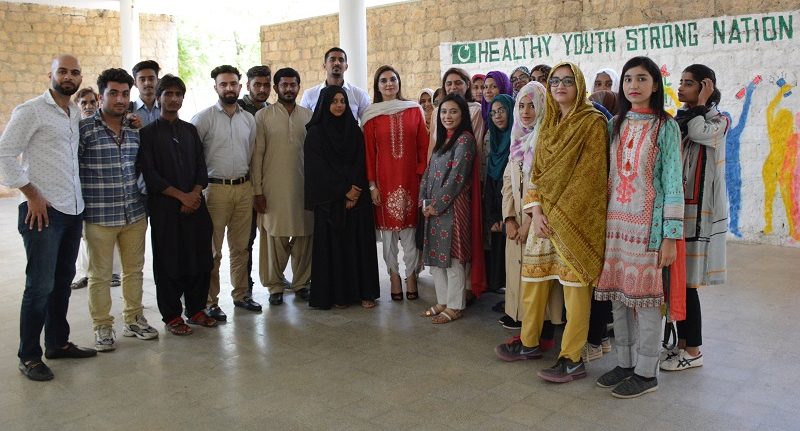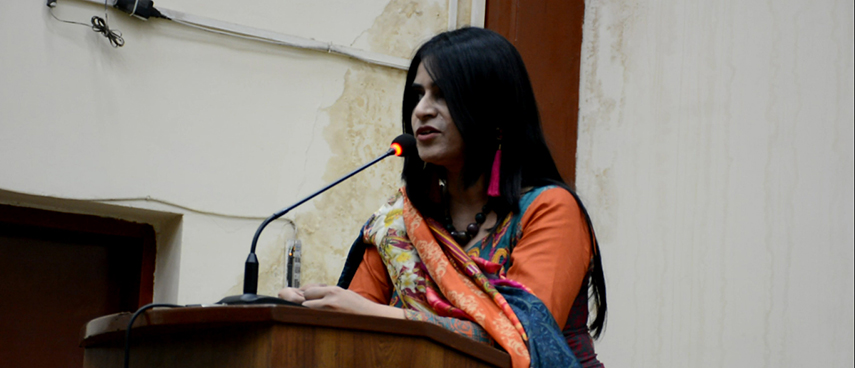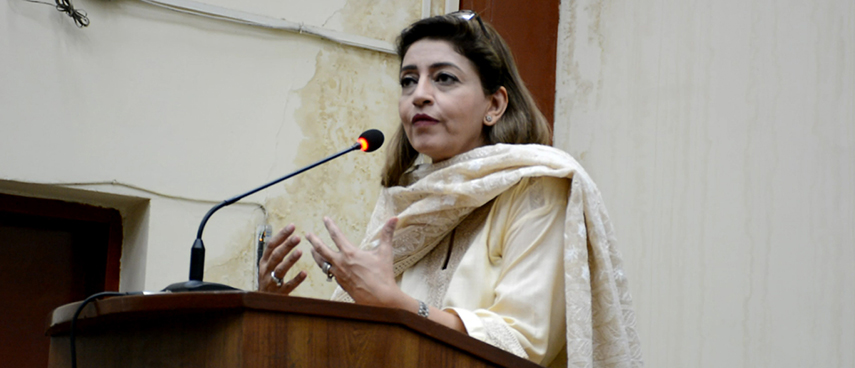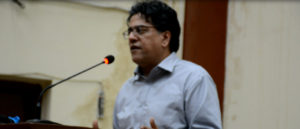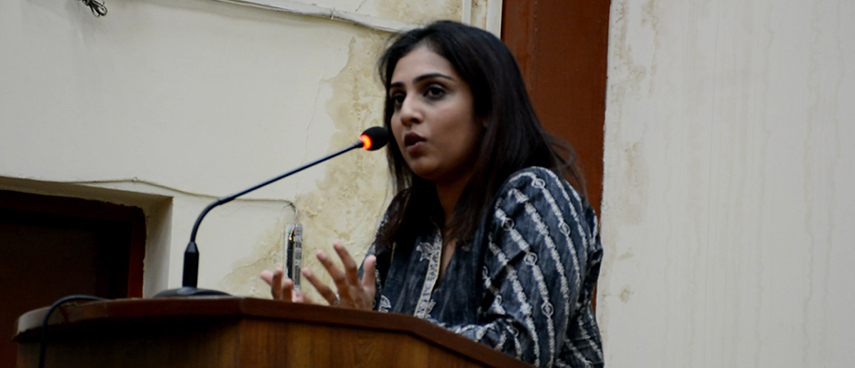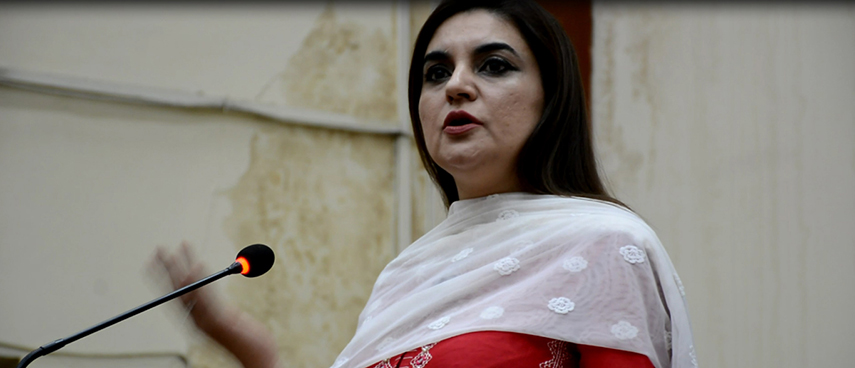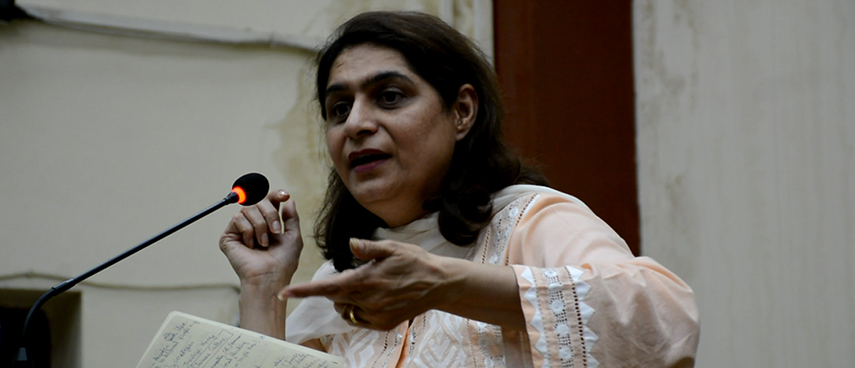The Center for Research and Security Studies (CRSS) conducted the seventh two-day PACE Collaborative workshops and debates for university students on August 26-27, 2019. The workshop was held at University of Karachi, Karachi. It was conducted under the umbrella of the Pakistan Center of Excellence (PACE), a counter-radicalization and pluralistic values’ focused project, in partnership with the Dutch Government. Participants included students from University of Karachi, Karachi.
Dr. Shumaila Shafket Ali, University of Karachi opened the session with a welcome note. Dr. Shumaila said that she has been affiliated with PACE for past three years and finds an immense pleasure to welcome CRSS team at the university. I must admit that the aim with which they are working to promote tolerance, diversity and tolerance, needs to be appreciated. In these seminars, we have to reflect on one thing that who are we producing in higher education system. Are we just producing the graduates or educated humans? There are many dimensions to the term educated humans; being educated means you have the ability to critically think, you have the ability to bring changes in your personality, you are compassionate enough to understand differences and perspectives and you are able to not only accept but celebrate diversity. All this requires a lot of tolerance and I am sure this seminar will help create that environment which is required for understanding and respecting differences. University of Karachi is the most diverse institution with different cultures, ethnicities, religions, genders and languages. Since, we are a diverse nation, we need to learn how to celebrate diversity. How to acknowledge and value each other and that is the beginning of a real learned, refined and educated society.
Dr. Huma Baqai was the first speaker to the seminar and had a session on ‘Fundamentals of Democracy, Governance and Accountability’. Dr. Baqai started off with defining democracy, saying that one meaning of democracy focuses on elections, and elected civilian government. The other approach talks of the quality and substance of democracy which have two aspects:
- Constitutionalism, the rule of law, civil and political rights;
- Delivery of basic services to common people, socioeconomic equity and hope for a better and secure future and political continuity.
The greatest threat to Pakistan’s viability has not come from its traditional foes in the bureaucracy or the military. In fact, in 1990 the President and the armed forces intervened to restructure the Parliament with a view to strengthening the government and hence the democratic institutions, Dr. Baqai added.
The greatest danger to democracy has rather stemmed from “political decay and the subsequent crisis of governance” that have emerged pursuant to the advent of the democratic process.
The civilian failure in Pakistan pertains to:
- Poor and selective governance
- Incapacity of civilian institutions to cope with terrorism and violence
- Corruption and flawed socioeconomic priorities
- Huge compromise on merit – loyalty is supreme
- Important/critical appointments are through political bribes
The initial weakness of the democratic movement, absence of strong political parties, mismanagement of government resources and functions, poor mechanism of accountability, and corruption; all combined to compromise on quality of governance. A crisis of governability threatens the prospects for a healthy development of democratic institutions.
Elaborating on accountability, Dr. Baqai stated that accountability ensures actions and decisions taken by public officials are subject to oversight, so as to guarantee that government initiatives meet their stated objectives and respond to the needs of the community they are meant to be serving, thereby contributing to better governance and poverty reduction. Unfortunately, the National Accountability Bureau has been used time and again by successive governments (military and civil) in Pakistan to further their own agendas.
Accountable governance involves systems and coordinated actions through which the public sector ensures effectiveness, efficiency and economy of public expenditure. It relies on tools that promote value-for-money, integrity and transparency in government, such as external control, internal control, sanctions, and enforcement. These tools create an enabling environment for greater accountability and improved governance.
Mr. Kamal Siddiqui -the second speaker – shared his thoughts on ‘Ethics in Media.’ The discussion was based on how media should be neutral and consider the values of a society. It should be careful with selection of words while reporting. Today’s media is more inclined towards sensationalism which should be avoided and a concept of self-censorship should be considered. The masses should not listen to biased abusive opinions which are aimed at belittling others.
Ms. Sateah Afreedi interacted with the participants on public speaking and how can they arrange debates and discussions in their classrooms. She started with the definition of public speaking, “Public speaking is an art where you’re able to stand in front an audience and deliver a speech, or to present your point of view in a manner that people stop and listen to you. It is often confused with just ‘talking in front of a crowd’, however, debating skills are something which not everyone has but may gain by working hard so that their natural speaking power can be improved and worked upon to turn one into an debater.” She discussed the different types of conferences; a declamation contest, Lincoln Douglas Styled Debate, and Model United Nations (MUN).
On second day of the seminar, the first session was conducted by Ms. Madiha Latif who spoke on ‘Gender Diversity and Women Empowerment.’ Ms. Latif started off with taking points from the participants on gender equality. Discussion included the points on equal opportunities for women as available for men. Gender equality also means that women can do everything that men can do. It also means equal responsibilities which go both ways. It means sharing house chores, and the work outside the house including jobs. In Pakistani culture, child rearing is usually considered a woman’s job but then how can a woman get equal access to the opportunities if she is supposed to do the house chores and child rearing only? We can not look at equality through a narrow lens, we need to look at it from a broader critical lens.
We see that when a woman is harassed, she is silenced through various ways including defamation, character assassination, tabooing, and also asking for proofs, and if she brings up the proofs; these are often declared as fake. Women empowerment is the call of hour, we have to educate our daughters and make them able to speak for themselves, for their rights.
Ms. Kashmala Tariq, Federal Ombudsperson for Protection against Harassment (FOSPAH) share her views on ‘Protection against Harassment.’ She said that FOSPAH was established under Protection against Harassment of Women at the Workplace Act 2010 and is a quasi-judicial and a regulatory body. It promptly redresses grievances of any person pertaining to harassment at workplace regardless of gender and provides immediate counselling to the aggrieved. She shared that the vision of FOSPAH is to vanguard the respect and dignity of all work-force in the cross-section of Pakistan. Ms. Tariq also highlighted the kind of harassments a woman can face at workplace which are as under:
Section 2(h) of Act, 2010 states:
- Any unwelcome sexual advance, request for sexual favors (verbal, written, or physical) or demeaning attitude
- Interference with work performance and creating a hostile environment
- Attempt to punish complainant for refusal to comply to a request or is made a condition for employment
Section 11 of Act 2010 states:
- Responsibility of the employer to ensure implementation of the Act 2010, including but not limited to
- Display of Code of Conduct for protection against harassment at the workplace at conspicuous place – as a part of management policy
- To form Inquiry Committee and designate Competent Authority as Section 3 of Act 2010
- On failure to comply to the Code of Conduct of Act 2010, a penalty of Rs. 25,000/ to Rs. 100,000/- may be imposed
- Training to be imparted to employees on a regular basis
She also shared information about the structure of the inquiry committee and the procedure for holding inquiry and Ombudsperson. She detailed about the penalties Ombudsperson can give if proven guilty in a harassment case.
Ms. Tariq concluded her session saying that Ombudsperson is trying best to bring about legislations to protect women from harassment at work place as well as at public and private space.
Last session of the seminar was conducted by Ms. Sameena Imtiaz who shared her thoughts on ‘Why Cultural Diversity Matters.’ Ms. Imtiaz detailed on defining cultural diversity. She said that the existence of a variety of cultural or ethnic groups within a society is cultural diversity. She also asked few questions from the students for critical analysis. She divided the students into different groups and assigned them with a task to reflect on other cultures or ethnicities of Pakistan. Ms. Imtiaz also discussed about the taboos associated with different cultures. She elaborated that we start putting people in different categories on the basis of certain characteristics and traits, even though they can be found in any other culture. She talked about how certain characteristics are specifically related to a gender, religions, sects, cultures, ethnicity, just because of the stereotyping. Stereotyping is something that is deeply rooted in our society. People judge each other on the basis of these stereotypical behaviours. There is no respect for differences and because of this disrespect, we consequently end up indulging in violent activities. We live in a society where we can find cultural, political and religious, ethnic and social diversity. Despite of living in this diverse society, we never tolerate or celebrate these differences in a positive manner. Instead, we try to manipulate and exploit each other. Stereotyping is an easy way of organizing and processing information in a negative way.
Ms. Farhana Kanwal closed the session with highlighting the importance of debates and critical thinking. She said that debate is a way of identifying and discussing the issues with logic and reason. She further enunciated that an ideal society would always look beyond differences and there will be respect of rights and opinions for all, with no discrimination. Ms. Kanwal, towards the end thanked the participating universities and students for their support and encouragement throughout the seminar.
The Center for Research and Security Studies (CRSS) conducted the seventh two-day PACE Collaborative workshops and debates for university students on August 26-27, 2019. The workshop was held at University of Karachi, Karachi. It was conducted under the umbrella of the Pakistan Center of Excellence (PACE), a counter-radicalization and pluralistic values’ focused project, in partnership with the Dutch Government. Participants included students from University of Karachi, Karachi.
Dr. Shumaila Shafket Ali, University of Karachi opened the session with a welcome note. Dr. Shumaila said that she has been affiliated with PACE for past three years and finds an immense pleasure to welcome CRSS team at the university. I must admit that the aim with which they are working to promote tolerance, diversity and tolerance, needs to be appreciated. In these seminars, we have to reflect on one thing that who are we producing in higher education system. Are we just producing the graduates or educated humans? There are many dimensions to the term educated humans; being educated means you have the ability to critically think, you have the ability to bring changes in your personality, you are compassionate enough to understand differences and perspectives and you are able to not only accept but celebrate diversity. All this requires a lot of tolerance and I am sure this seminar will help create that environment which is required for understanding and respecting differences. University of Karachi is the most diverse institution with different cultures, ethnicities, religions, genders and languages. Since, we are a diverse nation, we need to learn how to celebrate diversity. How to acknowledge and value each other and that is the beginning of a real learned, refined and educated society.
Dr. Huma Baqai was the first speaker to the seminar and had a session on ‘Fundamentals of Democracy, Governance and Accountability’. Dr. Baqai started off with defining democracy, saying that one meaning of democracy focuses on elections, and elected civilian government. The other approach talks of the quality and substance of democracy which have two aspects:
- Constitutionalism, the rule of law, civil and political rights;
- Delivery of basic services to common people, socioeconomic equity and hope for a better and secure future and political continuity.
The greatest threat to Pakistan’s viability has not come from its traditional foes in the bureaucracy or the military. In fact, in 1990 the President and the armed forces intervened to restructure the Parliament with a view to strengthening the government and hence the democratic institutions, Dr. Baqai added.
The greatest danger to democracy has rather stemmed from “political decay and the subsequent crisis of governance” that have emerged pursuant to the advent of the democratic process.
The civilian failure in Pakistan pertains to:
- Poor and selective governance
- Incapacity of civilian institutions to cope with terrorism and violence
- Corruption and flawed socioeconomic priorities
- Huge compromise on merit – loyalty is supreme
- Important/critical appointments are through political bribes
The initial weakness of the democratic movement, absence of strong political parties, mismanagement of government resources and functions, poor mechanism of accountability, and corruption; all combined to compromise on quality of governance. A crisis of governability threatens the prospects for a healthy development of democratic institutions.
Elaborating on accountability, Dr. Baqai stated that accountability ensures actions and decisions taken by public officials are subject to oversight, so as to guarantee that government initiatives meet their stated objectives and respond to the needs of the community they are meant to be serving, thereby contributing to better governance and poverty reduction. Unfortunately, the National Accountability Bureau has been used time and again by successive governments (military and civil) in Pakistan to further their own agendas.
Accountable governance involves systems and coordinated actions through which the public sector ensures effectiveness, efficiency and economy of public expenditure. It relies on tools that promote value-for-money, integrity and transparency in government, such as external control, internal control, sanctions, and enforcement. These tools create an enabling environment for greater accountability and improved governance.
Mr. Kamal Siddiqui -the second speaker – shared his thoughts on ‘Ethics in Media.’ The discussion was based on how media should be neutral and consider the values of a society. It should be careful with selection of words while reporting. Today’s media is more inclined towards sensationalism which should be avoided and a concept of self-censorship should be considered. The masses should not listen to biased abusive opinions which are aimed at belittling others.
Ms. Sateah Afreedi interacted with the participants on public speaking and how can they arrange debates and discussions in their classrooms. She started with the definition of public speaking, “Public speaking is an art where you’re able to stand in front an audience and deliver a speech, or to present your point of view in a manner that people stop and listen to you. It is often confused with just ‘talking in front of a crowd’, however, debating skills are something which not everyone has but may gain by working hard so that their natural speaking power can be improved and worked upon to turn one into an debater.” She discussed the different types of conferences; a declamation contest, Lincoln Douglas Styled Debate, and Model United Nations (MUN).
On second day of the seminar, the first session was conducted by Ms. Madiha Latif who spoke on ‘Gender Diversity and Women Empowerment.’ Ms. Latif started off with taking points from the participants on gender equality. Discussion included the points on equal opportunities for women as available for men. Gender equality also means that women can do everything that men can do. It also means equal responsibilities which go both ways. It means sharing house chores, and the work outside the house including jobs. In Pakistani culture, child rearing is usually considered a woman’s job but then how can a woman get equal access to the opportunities if she is supposed to do the house chores and child rearing only? We can not look at equality through a narrow lens, we need to look at it from a broader critical lens.
We see that when a woman is harassed, she is silenced through various ways including defamation, character assassination, tabooing, and also asking for proofs, and if she brings up the proofs; these are often declared as fake. Women empowerment is the call of hour, we have to educate our daughters and make them able to speak for themselves, for their rights.
Ms. Kashmala Tariq, Federal Ombudsperson for Protection against Harassment (FOSPAH) share her views on ‘Protection against Harassment.’ She said that FOSPAH was established under Protection against Harassment of Women at the Workplace Act 2010 and is a quasi-judicial and a regulatory body. It promptly redresses grievances of any person pertaining to harassment at workplace regardless of gender and provides immediate counselling to the aggrieved. She shared that the vision of FOSPAH is to vanguard the respect and dignity of all work-force in the cross-section of Pakistan. Ms. Tariq also highlighted the kind of harassments a woman can face at workplace which are as under:
Section 2(h) of Act, 2010 states:
- Any unwelcome sexual advance, request for sexual favors (verbal, written, or physical) or demeaning attitude
- Interference with work performance and creating a hostile environment
- Attempt to punish complainant for refusal to comply to a request or is made a condition for employment
Section 11 of Act 2010 states:
- Responsibility of the employer to ensure implementation of the Act 2010, including but not limited to
- Display of Code of Conduct for protection against harassment at the workplace at conspicuous place – as a part of management policy
- To form Inquiry Committee and designate Competent Authority as Section 3 of Act 2010
- On failure to comply to the Code of Conduct of Act 2010, a penalty of Rs. 25,000/ to Rs. 100,000/- may be imposed
- Training to be imparted to employees on a regular basis
She also shared information about the structure of the inquiry committee and the procedure for holding inquiry and Ombudsperson. She detailed about the penalties Ombudsperson can give if proven guilty in a harassment case.
Ms. Tariq concluded her session saying that Ombudsperson is trying best to bring about legislations to protect women from harassment at work place as well as at public and private space.
Last session of the seminar was conducted by Ms. Sameena Imtiaz who shared her thoughts on ‘Why Cultural Diversity Matters.’ Ms. Imtiaz detailed on defining cultural diversity. She said that the existence of a variety of cultural or ethnic groups within a society is cultural diversity. She also asked few questions from the students for critical analysis. She divided the students into different groups and assigned them with a task to reflect on other cultures or ethnicities of Pakistan. Ms. Imtiaz also discussed about the taboos associated with different cultures. She elaborated that we start putting people in different categories on the basis of certain characteristics and traits, even though they can be found in any other culture. She talked about how certain characteristics are specifically related to a gender, religions, sects, cultures, ethnicity, just because of the stereotyping. Stereotyping is something that is deeply rooted in our society. People judge each other on the basis of these stereotypical behaviours. There is no respect for differences and because of this disrespect, we consequently end up indulging in violent activities. We live in a society where we can find cultural, political and religious, ethnic and social diversity. Despite of living in this diverse society, we never tolerate or celebrate these differences in a positive manner. Instead, we try to manipulate and exploit each other. Stereotyping is an easy way of organizing and processing information in a negative way.
Ms. Farhana Kanwal closed the session with highlighting the importance of debates and critical thinking. She said that debate is a way of identifying and discussing the issues with logic and reason. She further enunciated that an ideal society would always look beyond differences and there will be respect of rights and opinions for all, with no discrimination. Ms. Kanwal, towards the end thanked the participating universities and students for their support and encouragement throughout the seminar.

